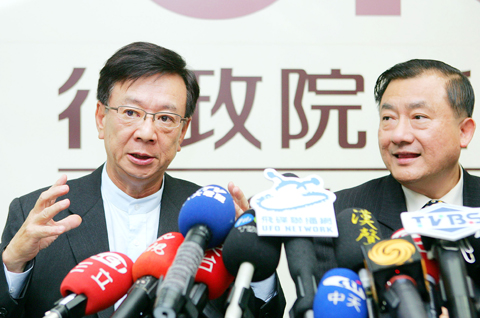The Ministry of Economic Affairs (MOEA) unveiled a plan to salvage the country’s pivotal memory chip industry yesterday by forming a new company, provisionally called Taiwan Memory Co (TMC), to forge strategic partnerships with a foreign firm.
The honorary vice chairman of United Microelectronics Corp, John Hsuan (宣明智), a semiconductor industry expert, will head the company and the government will hold less than half the shares.
Minister of Economic Affairs Yiin Chii-ming (尹啟銘) announced the lifeline to the dynamic random access memory chips (DRAM) industry at a press conference in Taipei, adding that the key goal was forming a strategic alliance with top foreign rival.

PHOTO: MAURICE TSAI, BLOOMBERG
Hsuan said the new company was expected to be up and running in six months and he set a three-month timeframe to complete negotiations on an alliance with either Micron Technology Inc in the US or Japan’s Elpida Memory Inc.
The industry veteran said he accepted the task because he felt a sense of urgency and believed that the restructuring plan initiated by the ministry was feasible and could make the industry more competitive.
“We will form a seed force at once and draw up a plan to discuss with Micron and Elpida … Our goals are to acquire their intellectual property and core technologies in design and production to elevate the competitiveness of DRAM manufacturers in Taiwan to a world-class standing,” Hsuan said.
The government had considered several consolidation scenarios for DRAM manufacturers, who have been hard hit by falling consumer demand and a supply glut since last year.
But the idea of creating a new company with start-up capital from the government was a recent idea.
Yiin said the Industrial Development Bureau has been in talks with Micron and Elpida on the consolidation plan and had gotten a warm response from both.
“For the moment we prefer to pick either Micron or Elpida, but we have not ruled out the possibility of cooperating with both of them if they both offer attractive proposals,” he said.
Under the ministry’s plan, Taiwan Memory Co would seek an investment from the National Development Fund (NFD), the state-owned venture capital fund, and from private funds.
Hsuan said the TMC would not set up its own factories in Taiwan, but would talk with the six local DRAM makers, who have suffered massive losses and have expressed a willingness to join the consolidation plan.
He said the company would prioritize its work on securing independent autonomy technology from the overseas companies.
However, neither Hsuan nor Yiin gave further details of the TMC proposal, such as the amount the government was considering for an initial capital injection, the percentage of shares in the company the government would own and possible local partners.
Elpida, the world’s third-largest maker of DRAM chips used in mobile phones and home electronics, has a joint venture with Powerchip Semiconductor Corp while Micron has one with Nanya Technology Corp.
In the nine months to September, four leading Taiwanese DRAM makers jointly booked a record net loss of more than NT$90 billion (US$2.6 billion US), with a full-year loss surging to NT$120 billion.

The CIA has a message for Chinese government officials worried about their place in Chinese President Xi Jinping’s (習近平) government: Come work with us. The agency released two Mandarin-language videos on social media on Thursday inviting disgruntled officials to contact the CIA. The recruitment videos posted on YouTube and X racked up more than 5 million views combined in their first day. The outreach comes as CIA Director John Ratcliffe has vowed to boost the agency’s use of intelligence from human sources and its focus on China, which has recently targeted US officials with its own espionage operations. The videos are “aimed at

STEADFAST FRIEND: The bills encourage increased Taiwan-US engagement and address China’s distortion of UN Resolution 2758 to isolate Taiwan internationally The Presidential Office yesterday thanked the US House of Representatives for unanimously passing two Taiwan-related bills highlighting its solid support for Taiwan’s democracy and global participation, and for deepening bilateral relations. One of the bills, the Taiwan Assurance Implementation Act, requires the US Department of State to periodically review its guidelines for engagement with Taiwan, and report to the US Congress on the guidelines and plans to lift self-imposed limitations on US-Taiwan engagement. The other bill is the Taiwan International Solidarity Act, which clarifies that UN Resolution 2758 does not address the issue of the representation of Taiwan or its people in

US Indo-Pacific Commander Admiral Samuel Paparo on Friday expressed concern over the rate at which China is diversifying its military exercises, the Financial Times (FT) reported on Saturday. “The rates of change on the depth and breadth of their exercises is the one non-linear effect that I’ve seen in the last year that wakes me up at night or keeps me up at night,” Paparo was quoted by FT as saying while attending the annual Sedona Forum at the McCain Institute in Arizona. Paparo also expressed concern over the speed with which China was expanding its military. While the US

SHIFT: Taiwan’s better-than-expected first-quarter GDP and signs of weakness in the US have driven global capital back to emerging markets, the central bank head said The central bank yesterday blamed market speculation for the steep rise in the local currency, and urged exporters and financial institutions to stay calm and stop panic sell-offs to avoid hurting their own profitability. The nation’s top monetary policymaker said that it would step in, if necessary, to maintain order and stability in the foreign exchange market. The remarks came as the NT dollar yesterday closed up NT$0.919 to NT$30.145 against the US dollar in Taipei trading, after rising as high as NT$29.59 in intraday trading. The local currency has surged 5.85 percent against the greenback over the past two sessions, central